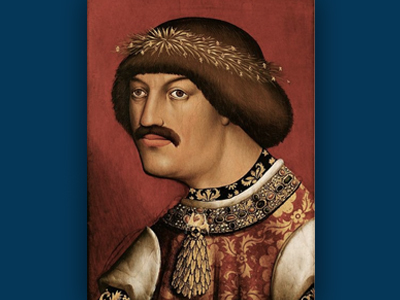
May 23, 1420
Following the teachings of a Czech priest, Jan Hus, who argued against the corruption of the Papacy and Church officials, a reform-minded movement emerged in Christianity in the early 15th century. After Hus was executed for heresy in 1415, his followers, the Hussites, rebelled against the church in a series of crusades.
The Hussite wars were disastrous for the Jewish communities of Bohemia and Austria. Catholics accused Jews of providing money and weapons to the Hussites. Dominican priests denounced the Jews, inflaming the public’s antisemitism. Attacks against Hussites were often preceded by massacres of Jews.
Albert (Albrecht) V, who had become archduke when he was only 7 years old in 1404, was influenced by the religious fanaticism sweeping through Austria as a result of the Hussite Wars. During Easter, a rumor circulated that a wealthy Viennese Jew named Israel had purchased consecrated hosts from the church and distributed them among Jews for desecration. Israel was brought to Vienna, where he was tortured and forced to confess.
After the forced confession, on May 23, Albert V issues the Wiener Gesera (Viennese Decree), ordering all Austrian Jews imprisoned and their possessions confiscated. Poorer Jews are sent off in boats on the Danube River. Numerous children are separated from their parents and delivered to monasteries, where they are converted. Many Jews take their own lives. On March 12, 1421, between 200 and 300 Jews who remain in Austria and have not converted to Christianity are burned at the stake.
The precarious state of Austrian Jews is typical for Jews in Europe during the Middle Ages.
